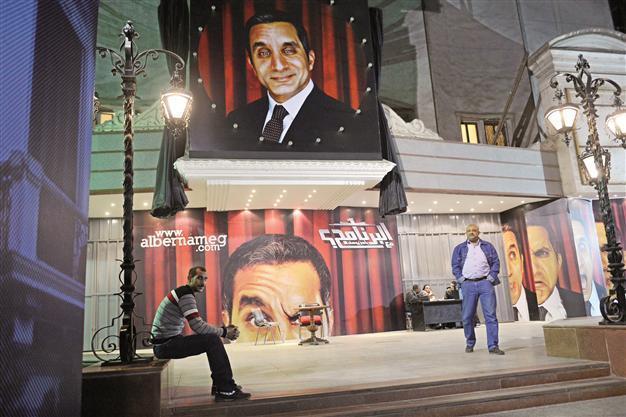Cairo and Washington engage in ‘twitter war’
CAIRO / WASHINGTON

Egyptians walk past posters of Egyptian satirist Bassem Youssef. The US Embassy in Cairo has drawn criticism for its tweet related to popular satirist. AFP photo
The U.S. Embassy in Cairo came under fire from both the Egyptian government and the U.S. State Department for causing a controversy with its tweet related to the interrogation of a popular satirist.The embassy tweeted a link to a monologue by “The Daily Show” host Jon Stewart that mocked Egypt’s president, offending the Egyptians, and then deleted its entire Twitter account before restoring it without the post in question, irritating Washington.
The trouble began on April 2 when the embassy posted a link to the monologue from his show. Stewart took savage aim at Egyptian President Mohamed Morsi for the arrest and interrogation of Egyptian comic Bassam Youssef, who has frequently criticized the president on a popular television program that has been likened to Stewart’s own. In the clip, Stewart accused Morsi of being petty, undemocratic and ignoring more pressing problems like Egypt’s economic crisis and violent crime to go after satirists who are critical of his government.
‘Inappropriate act’
Morsi’s office responded to the embassy’s post on its own Twitter feed, saying: “It’s inappropriate for a diplomatic mission to engage in such negative political propaganda.” The embassy responded a day later by deleting its entire account, incurring the wrath of State Department headquarters in Washington, which was already peeved by the initial post. The account was then restored minus the Stewart tweet.
“We’ve had some glitches with the way the Twitter feed has been managed. This is regrettably not the first time,” State Department spokeswoman Victoria Nuland said April 3 at a daily press briefing. “Embassies and consulates and their senior leadership manage the content that is on their feeds and they are expected to use good policy judgment in doing that,” she told reporters. She declined to say if the State Department agreed with the Egypt’s criticism, but she suggested the embassy had erred by posting a link to a video that is already available on the Internet.
The imbroglio over the tweet comes at a time of rising tensions between Cairo and Washington, which has expressed deep concerns that Morsi’s government is backsliding on human rights protections. It also underscores the pitfalls of allowing individual American embassies to control the messages they disseminate through social media.
Nuland stressed that the U.S. position on the arrest of Youssef remained unchanged and referred to it as part of a “’disturbing trend” of growing restrictions on freedom of expression in Egypt. The Muslim Brotherhood’s Freedom and Justice Party denounced Nuland’s comments on April 2 as “blatant interference” in Egypt’s internal affairs. Hours later, Secretary of State John Kerry jumped into the fray saying that Egypt is at a “tipping point.”
The U.S. Embassy in Cairo last year engaged in a public spat with Muslim Brotherhood over the breaching of the embassy’s walls by protesters angered by an anti-Islam film produced in the U.S. and posted on the Web.
















